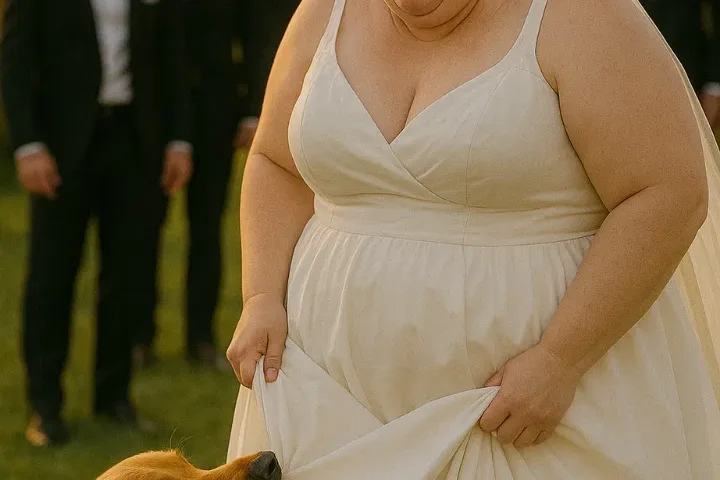On that radiant summer day, Cherry Valley looked like it had stepped right out of a fairytale.
The whole village had gathered to celebrate the wedding of Elena and Nicole — two young, radiant souls whose love had come to symbolize hope after years weighed down by drought, disease, and the bitter disputes of the elders that had drained the community’s spirit.
No one noticed the lone figure moving along the edge of the road — a woman cloaked in a gray shawl that hid her face. Her steps were measured, almost gliding, as she approached the cheerful crowd unnoticed.
Except for one.
Milo, the village dog, dozed in the shade near the old well. At the woman’s movement, his ears twitched, the fur along his spine stiffened, and his tail lifted cautiously. His gaze sharpened, alert and piercing. He sensed something that no one else could — an instinctive awareness that this was no ordinary day of joy. There was danger in the air.

The woman moved awkwardly, as if weighed down by something beneath her dress.
Her eyes remained fixed on the ground, avoiding every glance. And Milo… he understood. In the silent, instinctive way animals do, he knew something was wrong.
Without warning, Milo sprang up. A single, sharp bark sliced through the music like a lightning strike. The crowd froze. The band stopped playing. All eyes turned toward the commotion as Milo charged at the stranger.
She recoiled, startled, but Milo lunged, seizing the hem of her dress in his teeth and tugging. Nicole and several other men rushed forward, assuming the dog had been overwhelmed by the excitement.
Then came the chilling revelation.
From the folds of the fabric, a metal box dropped onto the cobblestones — wires tangled around a small red screen that emitted a high-pitched beep, echoing through the stunned silence.

A gasp rippled through the crowd.
“Stay back!” the woman cried out.
But Nicole had already grabbed her arm. Elena, pale and trembling, stepped away, her hands clutching her dress. The digital numbers on the device flickered.
“It’s a bomb!” someone shouted.
Milo remained perfectly still, planted between the woman and the device, his growl low and steady.
The woman’s shawl slipped back, revealing a pale, gaunt young face framed by light hair. Her eyes were ringed with exhaustion and grief.
“I didn’t want this…” she said, her voice breaking. “Five years… I’ve carried this pain for five years. My brother, Andre, was murdered in this very field. And no one… no one did anything. You all stayed quiet. You buried the truth.”

Nicole stared at her, horrified.
Softly, Elena spoke through tears, “It was never Nicole… it was a mistake. The man responsible fled… no one saw him again.”
The woman collapsed in sobs, her hands trembling above the bomb.
And then — Milo leapt. He slammed into her, knocking her back onto the stones. The box rolled across the square.
The timer blinked:
00:15…
An elderly man stepped forward from the crowd — Michael, once a military sapper, long retired. With surprising speed, he knelt, examined the wires, and with calm precision, severed the black cable.
The ticking stopped.
The screen went dark.
Silence.
For a moment, no one moved.

Then, gradually, the crowd began to cheer. They surrounded Milo, who stood with his tongue lolling and tail wagging, as if nothing extraordinary had occurred.
Nicole embraced Elena tightly, while the shaken woman was quietly led away, her sobs echoing as she disappeared into the crowd.
From that day forward, Cherry Valley’s tales included more than just weddings and harvests. People spoke of bravery, of truth finally spoken, and of a dog whose eyes seemed to hold something deeply human.
A wooden plaque was fixed to the well, reading:
“Here, Milo saved lives. The dog who was a man.”
